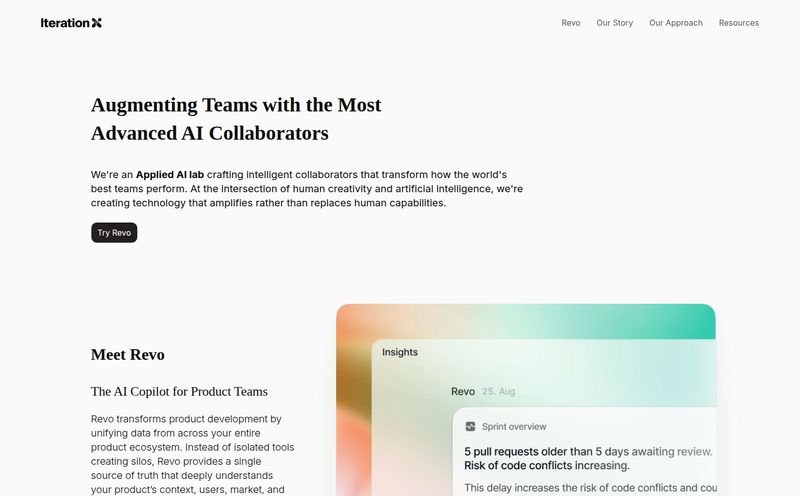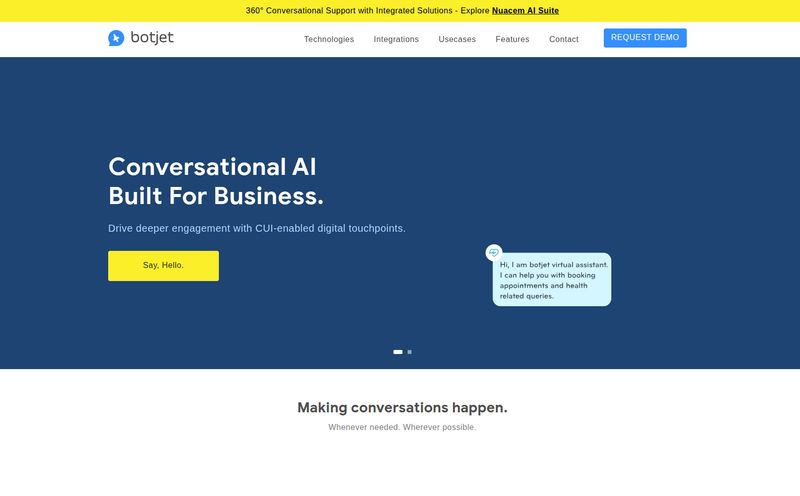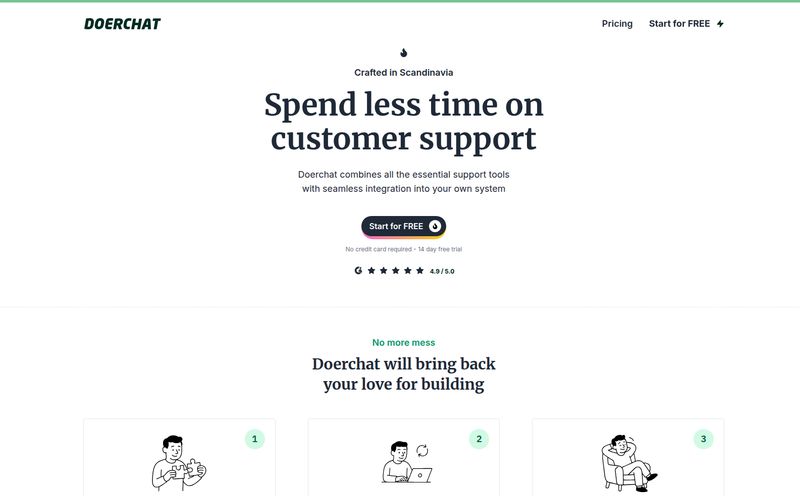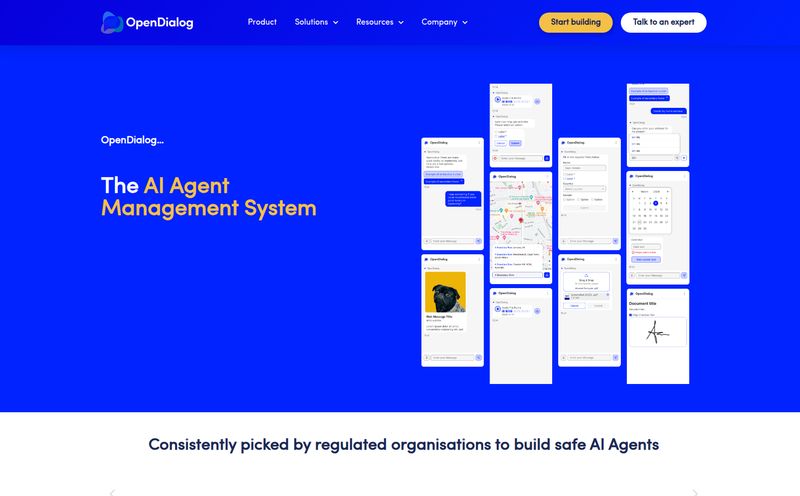The hunt for the perfect CRM is a bit of a nightmare, isn't it? I’ve been in the digital marketing and SEO game for years, and I’ve seen more CRM dashboards than I care to admit. Some are clunky relics from the early 2000s, others are so simple they’re basically just fancy spreadsheets. And every single one promises to revolutionize your business.
So, when I started hearing the buzz about Salesmate and its big claims about being an “AI-powered revenue operating system,” my skepticism meter went up. Another one? But I kept seeing it pop up, so I decided to roll up my sleeves and see if there was any fire behind all that smoke. Is this thing actually different, or is it just another tool with shiny new AI features bolted on?
So, What Exactly is Salesmate Anyway?
Okay, at its core, Salesmate is a Customer Relationship Management (CRM) platform. But calling it just a CRM feels like calling a smartphone just a phone. It's not wrong, but it misses the whole point. The company itself calls it a "revenue operating system," and I kinda get what they're going for. It’s designed to be the central hub, the very nervous system for all the parts of your business that touch a customer: sales, marketing, and support.
This is the first thing that caught my eye. So many CRMs are laser-focused on just the sales pipeline. Marketing gets its own separate (and usually expensive) platform, and customer support is often an afterthought handled by a completely different tool. Salesmate tries to bring all three under one roof. The idea is that your sales team knows what marketing campaigns a lead has seen, and your support team has the full context of a customer's sales journey. It sounds simple, but getting that unified view is a holy grail for a lot of businesses.
The Features That Actually Matter
A feature list can be long and boring. I'm not going to just dump it here. Instead, let's talk about the parts that I think make a real difference in the daily grind.
The AI Co-pilot is the Star of the Show
Let's not bury the lede. The biggest hook for Salesmate is its AI. They call it an AI Co-pilot, and it's woven into a lot of the platform. We're talking about AI helping you write follow-up emails, summarizing long call transcripts, and even providing intelligent insights on your deals. Think about the hours spent trying to craft the perfect outreach email. Now imagine an assistant giving you a solid first draft. That's the promise here.
My initial reaction? Cautious optimism. We've all seen the half-baked AI features that are more gimmick than useful. But from what I've seen, this is genuinely practical stuff. The ability to get a quick summary of a customer's entire history before a call is, frankly, a game-changer for busy account managers.
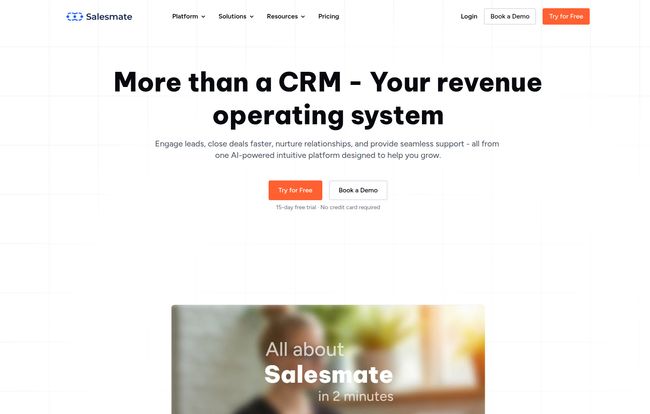
Visit Salesmate
Sales and Marketing Automation That Doesn’t Suck
Automation is one of those words that gets thrown around until it loses all meaning. In Salesmate, it refers to building “sequences” or “journeys” for your contacts. You can set up workflows that automatically send follow-up emails, create tasks for your sales reps, and even score leads based on their activity (like if they open an email or visit your pricing page).
This is where the magic of combining sales and marketing really happens. A new lead from a marketing campaign can be automatically dropped into a sales sequence without anyone having to lift a finger. It helps close that all-too-common gap where hot leads from marketing go cold before sales even sees them. It’s smoother, it's faster, and it just makes sense.
All Your Communication in One Place
One of my biggest pet peeves is having to jump between my email, my phone system, a texting app, and the CRM. It's inefficient and things get lost. Salesmate pulls this all together with built-in calling and two-way text messaging. You can call or text a lead directly from their contact record, and the entire conversation is logged automatically. Automatically. The Team Inbox feature also brings all your team's emails (like support@ or sales@) into one shared space, so nothing slips through the cracks. This isn’t a revolutionary idea, but their execution is really solid.
So, How Much Does Salesmate Cost?
Alright, the million-dollar question. Or, in this case, the $23-dollar question. The pricing structure is pretty standard for a SaaS company, with a few tiers based on your needs. All prices are per user, per month, which is important to remember as you scale your team.
| Plan | Price | Best For |
|---|---|---|
| Basic | $23/user/month | Startups and small teams needing solid pipeline management. |
| Pro | $39/user/month | Growing businesses that need more advanced automation and reporting. |
| Business | $63/user/month | Established teams wanting the full all-in-one sales, marketing, and support suite. |
| Enterprise | Custom | Large organizations needing custom solutions and enterprise-grade support. |
A quick note: They also have add-ons for things like extra AI credits or dedicated IP addresses. Just something to be aware of as you budget. Overall, the pricing is competitive. It's not the cheapest option on the market, but for the breadth of features you get, I'd say its fairly priced, especially for teams that would otherwise be paying for three separate tools.
The Good, The Bad, and The Honest Truth
No tool is perfect. Let's break it down, no fluff.
The good stuff is pretty obvious. The all-in-one nature is a huge win. Not having to stitch together three different platforms is a massive saving in both time and money. The AI features feel practical and well-integrated, not just a marketing gimmick. And with over 700 app integrations (including the all-powerful Zapier), you can connect it to pretty much any other tool in your stack. Thumbs up for that.
Now for the not-so-good stuff. First, there can be a bit of a learning curve. Any platform this powerful will take some time to master. It’s not something you can just jump into and be an expert in an hour. Second, the price. For a solopreneur or a really small startup, $23 a month per user can feel like a big commitment. There are cheaper, simpler options out there if all you need is a basic contact list. Lastly, the classic SaaS dilemma: some of the coolest features, like advanced marketing automation, are locked away in the higher-priced tiers. It's standard practice, but still a little frustrating when you see a feature you want is just out of reach on your current plan.
Who is Salesmate Really For?
After spending some quality time with it, I have a pretty clear picture of the ideal Salesmate user. This platform is a fantastic fit for small to medium-sized businesses that are in a growth phase. I’m talking about companies that have outgrown their collection of spreadsheets and free tools and are starting to feel the pain of having their sales, marketing, and support data in separate silos. If your teams are stepping on each others toes and leads are getting lost in translation, Salesmate is built to solve that exact problem.
Is it for everyone? Probably not. A freelancer or a one-person shop might find it to be overkill. A massive enterprise with thousands of employees might need the hyper-specific customization of a Salesforce or a custom-built solution. But for that huge segment of businesses in the middle, Salesmate hits a real sweet spot.
My Final Verdict on Salesmate
So, is Salesmate worth the hype? I came in skeptical, but I’m leaving impressed. It's a powerful, well-designed platform that genuinely tries to solve a core business problem: the disconnect between sales, marketing, and customer support. The AI is more than just a buzzword; it’s a practical tool that can save you real time.
It’s not the cheapest CRM out there, and it’s not the simplest. But it might just be one of the most complete and forward-thinking options for a growing business in 2024. If you're tired of juggling multiple platforms and you believe that a unified customer view is the key to growth—which, let's face it, it is—then you should definitely take advantage of their 15-day free trial. You have nothing to lose, and you might just find the CRM you've been looking for.
Frequently Asked Questions
What is Salesmate used for?
Salesmate is an all-in-one platform for managing customer relationships. It combines tools for sales pipeline management, marketing automation (like email campaigns and customer journeys), and a full customer support suite, including a team inbox and built-in calling.
Does Salesmate have a free trial?
Yes, Salesmate offers a 15-day free trial for new users. This gives you a chance to test out the features and see if it's a good fit for your team before committing to a paid plan. You dont need a credit card to sign up for the trial.
Can I integrate Salesmate with other apps?
Absolutely. This is one of its strengths. Salesmate integrates with over 700 third-party applications. This includes major players like Google Workspace, Microsoft 365, Slack, and, most importantly, Zapier, which allows you to connect it to thousands of other web apps.
Is Salesmate easy to use?
It's a powerful platform, so there is a learning curve, especially if you want to use its advanced automation features. However, the user interface is modern and generally intuitive. Most users find they can get the basics down quickly, but mastering the full platform will take some time and effort.
What kind of customer support does Salesmate offer?
Salesmate provides good customer support through multiple channels. You can reach them via live chat on their website, email, and phone. They also offer video assistance for more complex issues, which is a nice touch.
How does Salesmate's AI work?
The AI Co-pilot in Salesmate uses artificial intelligence to assist with various tasks. It can help you draft emails and messages, summarize long conversations or call notes, and provide data-driven insights to help you prioritize deals and activities. It's designed to be a productivity booster for your teams.
